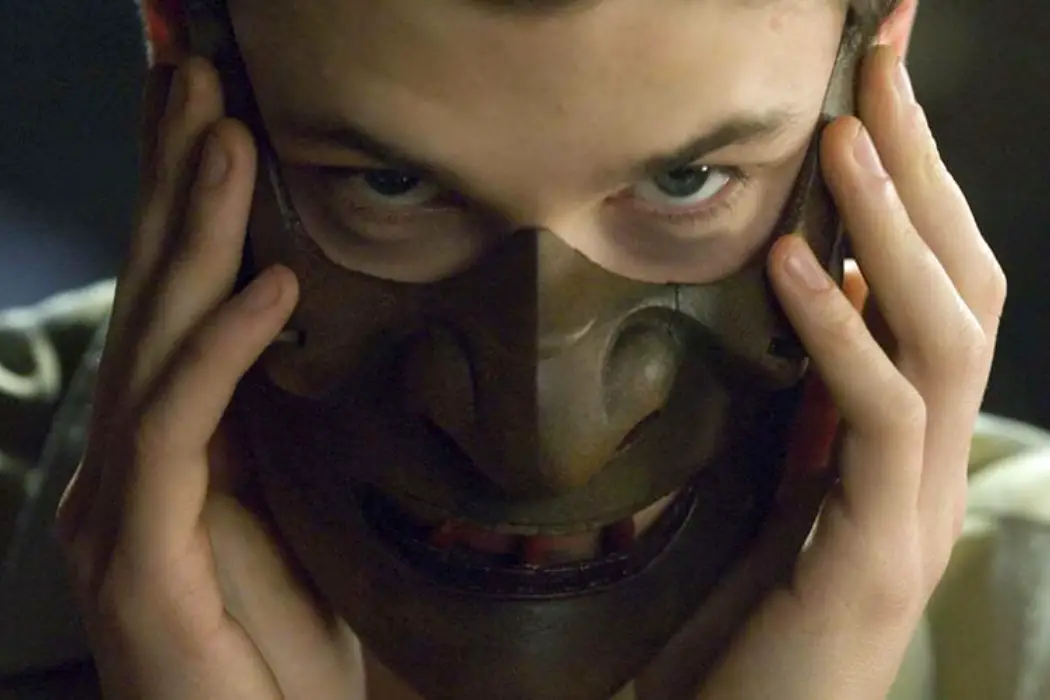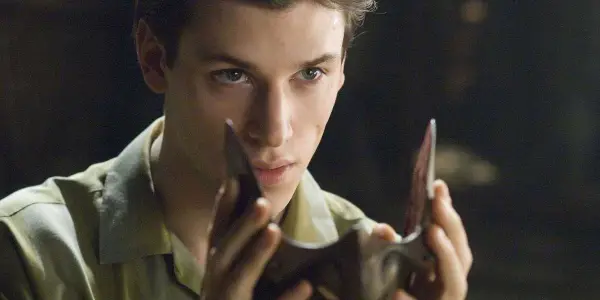HANNIBAL RISING: Anti-Fascism Without Ideology

Danny Anderson teaches English at Mount Aloysius College in PA.…
Hannibal Rising will probably always be an under-appreciated footnote to the Hannibal Lecter literary and cinematic universes. The prequel takes us back to Lecter’s origins. First, we see him as a victim of atrocities during World War II, then we see the monster emerge in an extended revenge thriller. Both the novel and the accompanying film are tightly plotted and provide plenty of opportunities to be simultaneously fascinated and repulsed by Hannibal Lecter. It is, in its own right, a fine entry in the franchise.
The film was uniformly dismissed by critics at the time of its release, which is a shame, as it not only provides a plausible backstory for Hannibal’s psychology and plenty of gruesome spectacles, it also features a wonderful performance by Gaspard Ulliel, who may capture the Lecter of the novels more closely than any of the other great actors who have portrayed the beloved fiend. His presence is truly unnerving to other characters in exactly the way the Thomas Harris books portray.
The neglect of this particular Lecter tale is also sad because the story of Hannibal’s development has remarkable relevance for a moral dilemma we face in these times of political upheaval. Here, I’d like to argue that Hannibal’s revenge is politics without purpose. Yes, he fights against fascism, but with no positive counter-ideology of his own. Hannibal Lecter’s own monstrosity is the final result of his anti-fascism because it was not rooted in a value system beyond the aesthetics of revenge.
For the uninitiated, Hannibal Rising takes the viewer back to Lecter’s childhood in Lithuania in WWII, where we see his family killed in the chaos of the Soviet-Nazi conflict that encroached on their happy, aristocratic life in the countryside. Only young Hannibal and his sister, Mischa survive, hiding out in a remote cabin in the forest until a band of war profiteers seeks shelter from the brutal winter there. Starvation drives the war criminals to cannibalism, the boy watching his baby sister taken away to be eaten just before the Soviets attack and rescue our “hero.” Eventually, Hannibal escapes the Soviet orphanage he is subsequently raised in (his old house) and finds his way to France and lives with the Japanese wife of his late uncle. It is here that teenaged Lecter discovers the criminals who killed his sister and embarks on the dark journey that leads to his own cannibalistic, monstrous identity.
Fascism as the Enemy
Like any good revenge thriller, the film makes us identify with Hannibal along his dark journey, in spite of what we already know about him from the previous Lecter tales. First, we see the horrific tragedy that befalls his baby sister. This alone generates enough sympathy for the monster-in-waiting that the viewer hopes he succeeds in avoiding capture until he can avenge Mischa’s death.

In addition to the sympathy we feel for his family tragedy, however, there is also the question of Hannibal’s prey in this story. If they are not Nazis in the strictly literal sense of the word, they are deeply associated with fascism. His first victim is a French Vichy collaborator. The war profiteers worked with Nazis during the war and maintained their odious ways long after.
Particularly to a modern viewer, who may have taken perverse pleasure in seeing Richard Spencer punched in the face during an interview on the street, the idea of violent resistance against Nazis and other white supremacists has a rather romantic appeal. Our sad era has seen a resurgence of nationalism and other forms of fascism in both Europe and the United States. There is, therefore, a temptation to see Hannibal in this story as a kind of virtuous warrior, doing the work of vengeance that official well-meaning, state-sponsored Nazi hunters like Inspector Popil (Dominic West) fail to carry out.
Hannibal Lecter’s absent Ideology
To see Hannibal as a hero in this story, however tempting that might be for us today (whether or not you appreciate Antifa), is to miss an important moral and political point: to ethically fight a political monstrosity, one must work from a position of political virtue. Hannibal Lecter has no political ideology to ground his anti-fascism in. Just as his victims were Nazis only out of personal and professional convenience, Lecter’s anti-fascism is merely a convenient cover for what is merely a dark and murderous nature.
This political opportunism is clearer in Harris’s novel where Hannibal associates himself with Youth Communist groups periodically for strategic advantage (first to get himself back into Soviet-bloc Lithuania to investigate his past, then later to gain public sympathy for his crimes against escaped Nazis). In the film, Lecter simply indicates no discernible inclination toward politics. His interests are focused only on the academic study of cadavers in medical school and in taking personal revenge against the bullies he encounters.

His acts of vengeance exhibit a distinct glee, not in standing up against injustice, but in simply punishing and consuming his enemies. In season three of NBC’s Hannibal, Mads Mikkelsen’s Lecter enigmatically proclaims that “ethics become aesthetics.” This is a chilling insight into the depravity of Hannibal’s character. Above all else, this Lecter story depicts the origins and development of his eventual ethos of “Eat the Rude.” The fact that the “rude” in this case are fascists is merely incidental.
Politics as Posture
In all his stories, Lecter prizes aesthetics over all else. His exquisite taste in all things is his defining feature for those who meet him.
In Hannibal Rising we might say that the aesthetic he crafts for the public is that of political virtue. In the decade after WWII and the Holocaust, who would deny the virtue in hunting down and taking brutal vengeance upon escaped Nazis? It is this political taste that young Hannibal Lecter cultivates in the artworks of his first murders.
As I have argued here, however, his actions lack virtue because they are not rooted in a positive political vision. Had Lecter actually been a socialist, one might see his actions as a brutal means toward a justifiable end, that of human liberation from fascist tyranny. He was no socialist, however. He was simply a creature who took pleasure in the aesthetics of death, believing in nothing deeper than that. As Popil states, “his heart died with Mischa. What he is now, there’s no word for it, except monster.”
It is this point that makes this film seem so relevant in today’s political climate. So much of our politics are simply inflammatory stances that are little more than aesthetic materials for crafting a virtuous persona for Twitter. Our ethics have truly become little more than aesthetics, which is monstrous. Too often, there is no positive vision of politics behind our anti-fascism; there is nothing we are actually committed to fighting for. We fight simply for the satisfaction of eating the rude.
Resurgent fascism is a real issue and right-wing nationalism now literally has the ear of the White House. So much of our collective response to that is not actually political, however. It is the aesthetics of political virtue rather than a firm ideology of anti-fascism that we too often choose. Yes, there may be a short-term gratification to be experienced by “owning” the fascists for public consumption, but Hannibal Rising poses the question about what kinds of monsters we make of ourselves by settling for the aesthetics of political virtue.
Watch Hannibal Rising
Does content like this matter to you?
Become a Member and support film journalism. Unlock access to all of Film Inquiry`s great articles. Join a community of like-minded readers who are passionate about cinema - get access to our private members Network, give back to independent filmmakers, and more.
Danny Anderson teaches English at Mount Aloysius College in PA. He tries to help his students experience the world through art. In his own attempts to do this, he likes to write about movies and culture, and he produces and hosts the Sectarian Review Podcast so he can talk to more folks about such things. You can find him on Twitter at. @DannyPAnderson.













